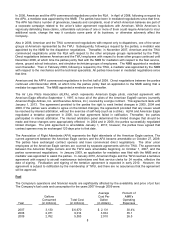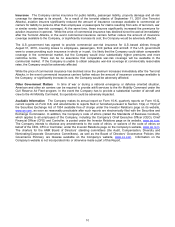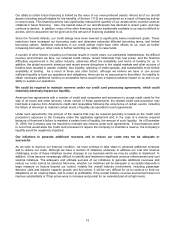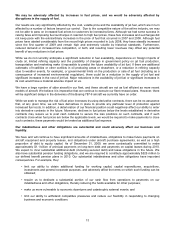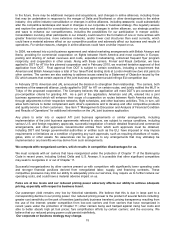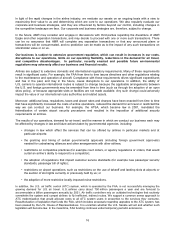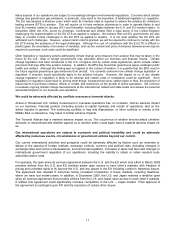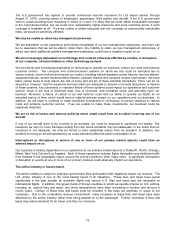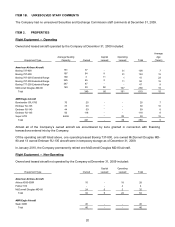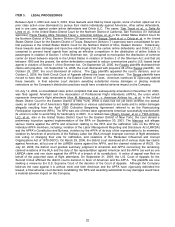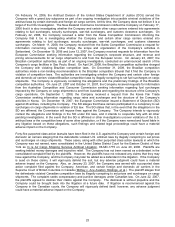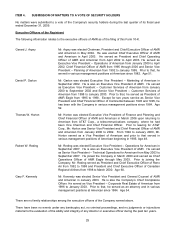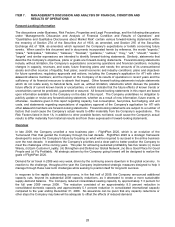American Airlines 2009 Annual Report Download - page 21
Download and view the complete annual report
Please find page 21 of the 2009 American Airlines annual report below. You can navigate through the pages in the report by either clicking on the pages listed below, or by using the keyword search tool below to find specific information within the annual report.
18
We could be adversely affected by an outbreak of a disease that affects travel behavior.
In the second quarter of 2009, there was an outbreak of the H1N1 virus which had an adverse impact throughout
our network but primarily on our operations to and from Mexico. In 2003, there was an outbreak of Severe Acute
Respiratory Syndrome (SARS), which had an adverse impact primarily on our Asia operations. In addition, in the
past there have been concerns about outbreaks or potential outbreaks of other diseases, such as avian flu. Any
outbreak of a disease (including a worsening of the outbreak of the H1N1 virus) that affects travel behavior could
have a material adverse impact on us. In addition, outbreaks of disease could result in quarantines of our
personnel or an inability to access facilities or our aircraft, which could adversely affect our operations.
Our labor costs are higher than those of our competitors.
Wages, salaries and benefits constitute a significant percentage of our total operating expenses. In 2009, they
constituted approximately 33 percent of our total operating expenses. All of the major hub-and-spoke carriers with
whom American competes have achieved significant labor cost savings through or outside of bankruptcy
proceedings. We believe American’s labor costs are higher than those of its primary competitors, and it is unclear
how long this labor cost disadvantage may persist. These higher labor costs may adversely affect our ability to
achieve and sustain profitability while competing with other airlines with lower labor costs. Additionally, we cannot
predict the outcome of our ongoing negotiations with our unionized work groups. Significant increases in pay and
benefits resulting from changes to our collective bargaining agreements could have a material adverse effect on
us.
We could be adversely affected if we are unable to have satisfactory relations with any unionized or other
employee work group.
Our business is labor intensive. To the extent that we are unable to have satisfactory relations with any unionized
or other employee work group, our operations and our ability to execute our strategic plans could be adversely
affected. In addition, any disruption by an employee work group (e.g., sick-out, slowdown, full or partial strike, or
other job action) may materially adversely affect our operations and impair our financial performance.
American is currently in mediated negotiations under the auspices of the NMB with each of its three major unions
to amend their respective labor agreements. These negotiations are governed by the RLA, which prescribes no
set timetable for the negotiations and mediation process. The negotiations and mediation process in the airline
industry typically is slow and sometimes contentious. The RLA prohibits the parties from engaging in self-help
prior to the exhaustion of the RLA’s bargaining process. That process is not exhausted until the NMB has
declared the parties are at a bargaining impasse, one or both parties has declined the NMB’s proffer of binding
arbitration, and a 30-day cooling off period has expired without the appointment of a Presidential Emergency
Board. If we are unable to reach agreement with any of our unionized work groups, and the RLA’s bargaining
process has been fully exhausted, we may be subject to lawful strikes, work stoppages or other job actions.
In addition, the union that represents American’s pilots has filed a number of grievances, lawsuits and complaints,
most of which American believes are part of a corporate campaign related to the union’s labor agreement
negotiations with American. While American is vigorously defending these claims, unfavorable outcomes of one
or more of them could require American to incur additional costs, change the way we conduct some parts of our
business, or otherwise adversely affect us.
Our insurance costs have increased substantially and further increases in insurance costs or reductions
in coverage could have an adverse impact on us.
We carry insurance for public liability, passenger liability, property damage and all-risk coverage for damage to
our aircraft. As a result of the Terrorist Attacks, aviation insurers significantly reduced the amount of insurance
coverage available to commercial air carriers for liability to persons other than employees or passengers for
claims resulting from acts of terrorism, war or similar events (war-risk coverage). At the same time, these insurers
significantly increased the premiums for aviation insurance in general. While the price of commercial insurance
has declined since the period immediately after the Terrorist Attacks, in the event commercial insurance carriers
further reduce the amount of insurance coverage available to us, or significantly increase its cost, we would be
adversely affected.


